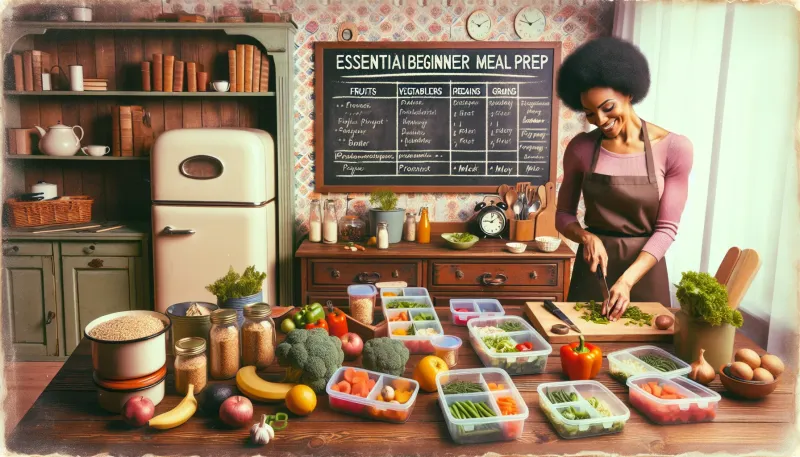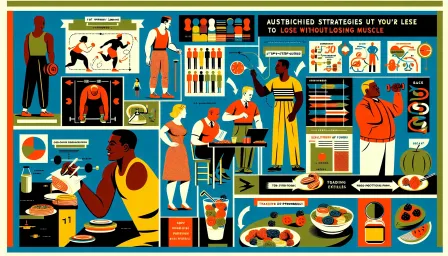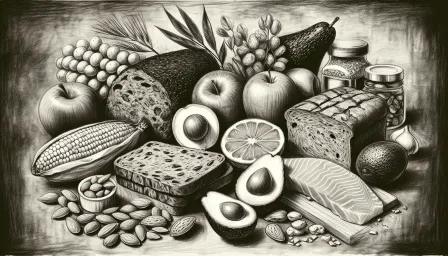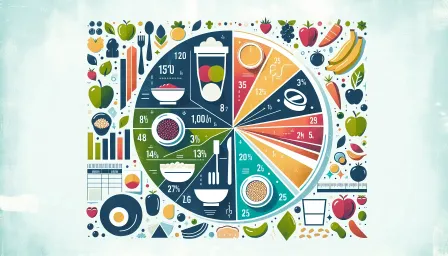Essential Beginner Meal Prep Tips for a Stress-Free Week

Discover essential beginner meal prep tips for a stress-free week. Learn how to plan, shop, and prepare meals to save time, reduce stress, and eat healthier.
Meal prepping is an essential practice for anyone looking to save time, reduce stress, and maintain a healthy diet. Whether you're a busy professional or a student, these beginner meal prep tips will help you stay organized and efficient throughout the week. Let's dive into the fundamentals of meal prep, covering everything from planning and shopping to cooking and storing your meals.
1. Plan Your Meals
Planning is the cornerstone of effective meal prep. Here's how to get started:
- Choose Your Recipes: Select a variety of recipes that you enjoy and that are easy to prepare in bulk. Aim for a balance of protein, vegetables, and whole grains.
- Create a Menu: Once you have your recipes, create a weekly menu. This will help you stay organized and ensure you have all the necessary ingredients.
- Consider Your Schedule: Take into account your weekly commitments. Opt for quick and easy recipes on days when you anticipate being busy.
Long-Term Benefits of Planning
Investing time in planning your meals can save you hours during the week, reduce food waste, and help you stick to a healthy diet. It's a small upfront effort that yields significant long-term results.
2. Make a Shopping List
Once your menu is ready, the next step is to create a detailed shopping list. Break it down by categories like produce, proteins, dairy, and pantry items. This helps you navigate the grocery store more efficiently and ensures you don't forget any crucial ingredients.
Additionally, consider these tips:
- Stick to Your List: Avoid impulse purchases by strictly adhering to your shopping list.
- Buy in Bulk: Purchasing staples like grains, beans, and spices in bulk can save you money in the long run.
- Consider Seasonal Produce: Choosing seasonal fruits and vegetables can enhance the flavor of your meals and reduce costs.
3. Prep Ingredients in Advance
Prepping your ingredients in advance can significantly cut down on cooking time during the week. Start by washing, chopping, and storing vegetables in airtight containers. Marinate proteins, cook grains, and prepare any sauces or dressings ahead of time.
Kitchen Essentials for Prepping
A few kitchen tools can make your meal prep more efficient:
- Good Knives: Invest in sharp, high-quality knives to make chopping a breeze.
- Cutting Boards: Use separate cutting boards for meats and vegetables to avoid cross-contamination.
- Storage Containers: Choose BPA-free containers in various sizes for easy storage and portion control.
4. Cook in Batches
Cooking in batches is a game-changer for meal prep. Prepare large quantities of favorite meals like soups, stews, casseroles, and proteins that can be used in multiple dishes throughout the week.
Consider these tips for successful batch cooking:
- One-Pot Meals: Opt for dishes that can be made in a single pot or pan to minimize cleanup.
- Versatile Ingredients: Cook versatile ingredients like grilled chicken or roasted vegetables that can be used in salads, wraps, and stir-fries.
- Freeze Extras: If you have more food than you need, freeze portions for future use. This reduces food waste and ensures you have healthy meals on hand.
5. Store Meals Properly
Proper storage is crucial to maintaining the freshness and quality of your prepped meals. Follow these guidelines:
- Airtight Containers: Use containers with tight-fitting lids to keep food fresh longer.
- Label and Date: Label your containers with the contents and dates to track when they were made. This helps you consume them before they spoil.
- Refrigerate or Freeze: Store meals in the refrigerator for up to 4 days or freeze for longer storage. Use different compartments in your fridge and freezer to keep ingredients organized.
Optimal Storage Tips
Keep these tips in mind for optimal storage:
- Use Glass Containers: Consider using glass containers for a more sustainable option that doesn't retain odors or stains.
- Stack Containers: To save space, stack containers neatly in your fridge or freezer.
- Avoid Single-Use Plastics: Reduce waste by using reusable storage options whenever possible.
6. Reheat and Enjoy
When it's time to eat, reheat your prepped meals thoroughly to ensure they're safe to consume. Most meals can be reheated in a microwave or on the stovetop.
Reheating Tips
Consider these tips for the best results:
- Microwave Safety: Use microwave-safe containers and cover food with a damp paper towel to retain moisture.
- Stovetop Heating: For a better texture, reheat certain foods like stir-fries or pasta on the stovetop.
- Avoid Overheating: Be cautious not to overheat food, as this can cause dryness or loss of nutrients.
Conclusion
Effective meal prep can transform your weekly routine, making healthy eating more manageable and less stressful. By planning your meals, making a detailed shopping list, prepping ingredients in advance, cooking in batches, and storing meals properly, you'll be well on your way to mastering the art of meal prep. Implement these beginner meal prep tips to enjoy a more organized and nutritious week ahead.



























